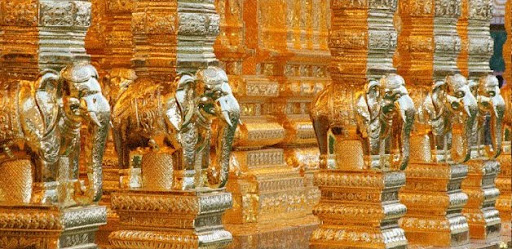Location: Sivaganga, 40 kms from Madurai
Built In: 1730s
Famous As: Gowri Vilasam
Called "Gowri Vilasam", the palace situated in the heart of Sivaganga about 40 km from Madurai, was the seat of many Marava kings. Now,only the dilapidated portions of the palace remain. Built in the architectural style of Thirumalai Nayak's period and infused with Rajputana arts, which the remains are mute witness to, the palace is said to have been ignored during the period of Rajah Doraisingh Thevar (1898-1941). Citing "bad luck" as the reason, he abandoned this palace to occupy another palace called "European Bungalow" on the Madurai Road. This led to the neglect of the palace and its plundering, mainly by the British.The worst damage is said to have been done during the period of late Vijayaraja Karthik, who sold most of the properties, antiques and wooden carving.
Inside The Palace
» The Temple of Sri Raja Rajeshwari
At the Gowri Vilasam, the only portion intact is the temple of Sri Raja Rajeshwari, the family deity of the royalty. The temple is open for the public in the evenings and on auspicious days. Otherwise, public are not allowed within the palace limits.
South of the temple is a huge hall supported with numerous pillars. All the functions of the royal household are said to have taken place there. But now the hall remains locked. In the front façade of the palace lies a palanquin in a dilapidated condition.
» Nadai Kinaru
Another interesting feature in the palace is a miniature swimming pool called "Nadai Kinaru". The tank is said to have direct connections to provide it with fresh water and provisions to fill two huge tanks beside the tank. This was meant mainly for the women of the royal family. In front of it is an architectural splendor, in a shambles. Paintings on the dome and sides in natural colours are still intact.
Built In: 1730s
Famous As: Gowri Vilasam
Called "Gowri Vilasam", the palace situated in the heart of Sivaganga about 40 km from Madurai, was the seat of many Marava kings. Now,only the dilapidated portions of the palace remain. Built in the architectural style of Thirumalai Nayak's period and infused with Rajputana arts, which the remains are mute witness to, the palace is said to have been ignored during the period of Rajah Doraisingh Thevar (1898-1941). Citing "bad luck" as the reason, he abandoned this palace to occupy another palace called "European Bungalow" on the Madurai Road. This led to the neglect of the palace and its plundering, mainly by the British.The worst damage is said to have been done during the period of late Vijayaraja Karthik, who sold most of the properties, antiques and wooden carving.
Inside The Palace
» The Temple of Sri Raja Rajeshwari
At the Gowri Vilasam, the only portion intact is the temple of Sri Raja Rajeshwari, the family deity of the royalty. The temple is open for the public in the evenings and on auspicious days. Otherwise, public are not allowed within the palace limits.
South of the temple is a huge hall supported with numerous pillars. All the functions of the royal household are said to have taken place there. But now the hall remains locked. In the front façade of the palace lies a palanquin in a dilapidated condition.
» Nadai Kinaru
Another interesting feature in the palace is a miniature swimming pool called "Nadai Kinaru". The tank is said to have direct connections to provide it with fresh water and provisions to fill two huge tanks beside the tank. This was meant mainly for the women of the royal family. In front of it is an architectural splendor, in a shambles. Paintings on the dome and sides in natural colours are still intact.




















